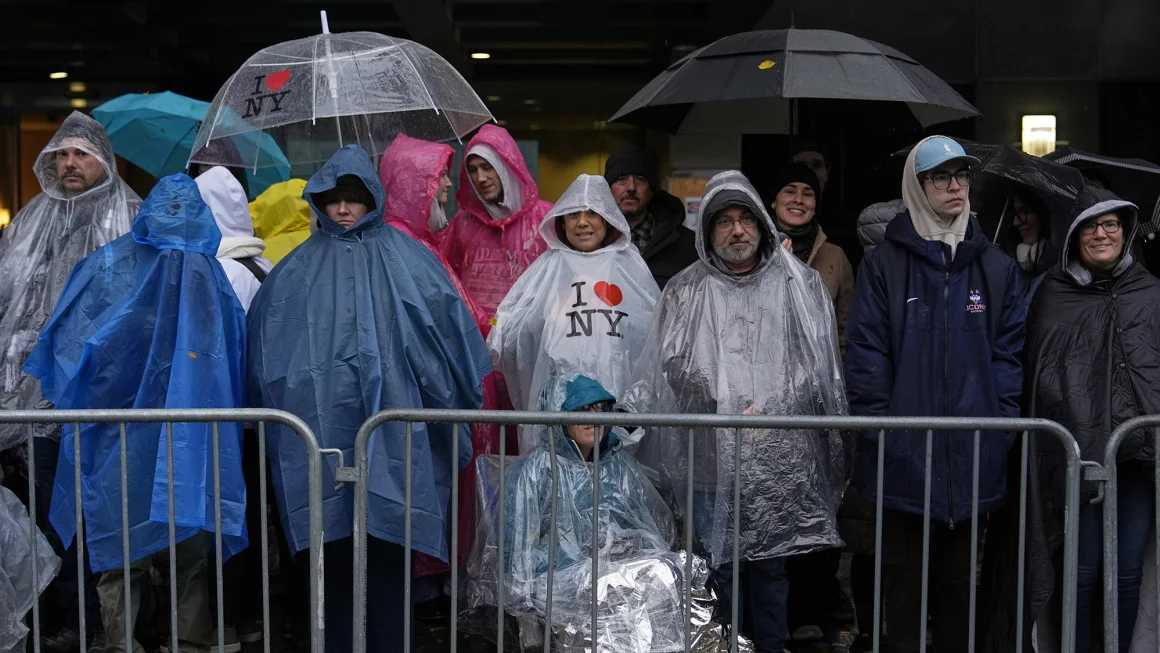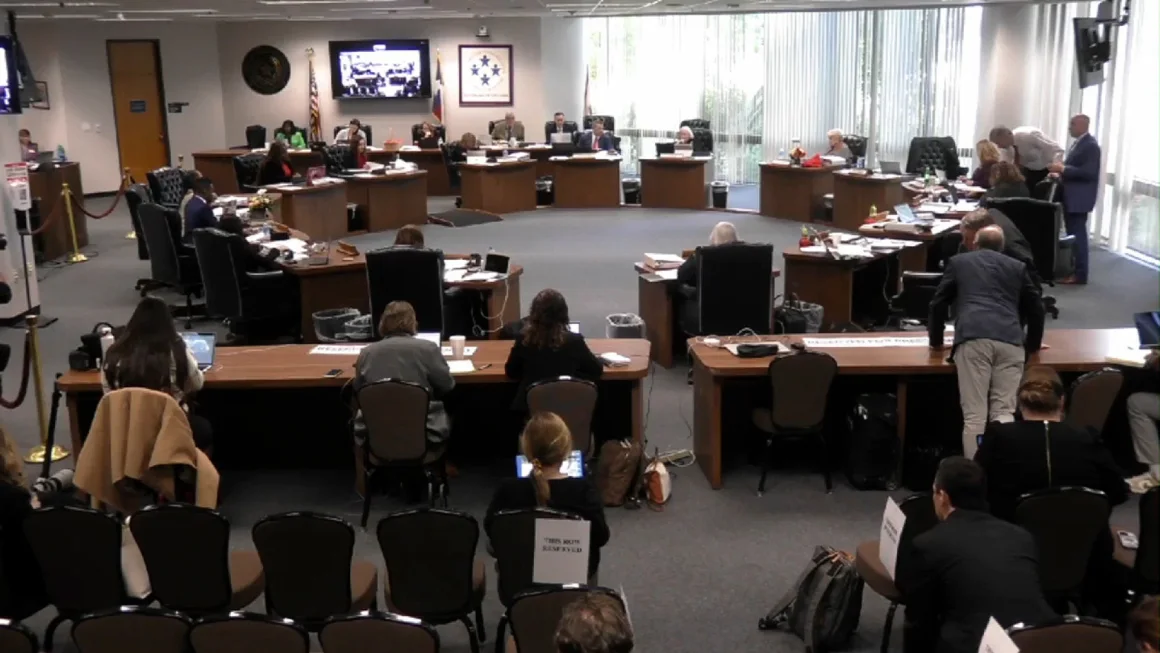CNN — Donald Trump’s obsession with election fraud that doesn’t exist in any significant form could drive the country into a government shutdown — and may even put the Republican House majority at risk.
In a fresh show of governing futility, Republican House Speaker Mike Johnson on Wednesday failed to pass a six-month extension of government funding, with a measure attached to please Trump that makes it harder for Americans to vote.
The Republican nominee’s demands for a bill that targets noncitizen voting, which is already illegal, pushed Johnson into a corner with no obvious exits, raising the possibility of a Washington crisis in the run-up to Election Day that could blow back on the GOP.
The gambit has zero chance of producing a new law — since Democrats who control the Senate oppose it. And Johnson couldn’t even get 16 of his own members to vote for it for various reasons — including unreconcilable demands by some arch conservatives for massive budget cuts, which also have no chance of making it into law because of the reality of divided power in Washington.
Johnson now appears to have little choice but to negotiate with Senate Democrats on a short-term funding measure. But given the tiny House GOP majority and Trump’s looming presence, every step the speaker takes will be perilous – especially if he hopes to cling to his job if Republicans succeed in holding the House in November.
Trump seems to be setting the GOP up for an intra-party fight that could turn into a disaster in November.
The history of government shutdowns suggests that the party with control of the House — which has initial responsibility for the public purse — usually pays the biggest political price. And if the speaker cannot beat a deadline of October 1 to fund federal operations, the government could partially shut down.
The former president isn’t in the habit of asking Republican Senate Minority leader Mitch McConnell for advice. But the Kentucky veteran warned on Tuesday that “the one thing you cannot have is a government shutdown. It’d be politically beyond stupid for us to do that right before the election, because certainly we’d get the blame.”

A potential self-inflicted wound for the GOP in Trump’s birth state
Ironically, Trump was on Wednesday in the state where his stand could wreak the most political damage for House Republicans. He held a big rally in New York, even though he’s part of a tiny minority of people who think he can deliver his birth state in November.
More importantly, New York is also home to several hugely competitive House races that went red in the 2022 midterm elections and paved the way for the slim GOP majority. A political crisis over a shutdown that angers voters would, therefore, risk sweeping some of the most vulnerable Republicans in the country out of their seats.
One of the most threatened Republican lawmakers, Rep. Mike Lawler, from the state’s 17th Congressional District, predicted on “The Source with Kaitlan Collins” Wednesday that the drama would end without a shutdown and that a funding bill would pass without the voting measure Trump wants included.
“The reality is that we are not shutting down the government with 45 days to go before the election,” Lawler, who supported the legislation, said.
Another at-risk New York Republican, Rep. Marc Molinaro, who got a shoutout at Trump’s rally in Uniondale, voted for Wednesday’s package — but signaled he did not support driving the country to the brink to make a political point. “We have to support the continuity of government,” Molinaro told reporters.
The elections measure, which already passed the House in a standalone vote earlier this year, would require documentary proof of US citizenship to vote in an election. Critics warn such a law could disenfranchise citizens who lack such documentation and say the legislation is a fix for a problem that does not exist.
Johnson has been happy to indulge Trump’s voter fraud claims – both after the 2020 election and this cycle. But his desire to please the former president and his base is leading him into a deep governing hole. The Louisiana Republican has also not provided evidence to back his claims that hundreds of thousands of undocumented migrants could vote in November.
It is not yet clear how far the ex-president will push this issue — given that the election registration measure is doomed. One possible interpretation of Johnson’s decision to bring the issue to the floor on Wednesday is that he wanted to demonstrate to his party, and even the ex-president himself, that the fight is hopeless.
“And so now we go back to the playbook, draw up another play, and we’ll come up with a solution,” the speaker told reporters, amid rising frustration among some members of the House GOP majority about the lack of clarity on the way forward.
But Johnson lacks any obvious play that will get him out of his jam.
A vote that only succeeded in brewing more GOP frustration
Rep. Marjorie Taylor Greene — the Georgia Republican who is a fervent Trump supporter and who has been a constant irritant for Johnson – voted “present” on Wednesday. But she wouldn’t say whether she supported closing down the government. She instead declared the speaker’s strategy a “complete failure” and added, “We weren’t here in the entire month of August and could have finished our 12 separate appropriations bills.”
The building showdown on Capitol Hill is far from the first time that Trump’s personal political goals have threatened to hurt his party. His backing, for instance, of a cast of weak candidates in the 2022 midterms — mostly because they endorsed his false claims of election fraud — appeared to be a factor in the failure of an expected red wave. And the ex-president’s antics promoted senatorial candidates that went onto lose in swing states, costing the party control of the Senate.
Trump’s pressure on Johnson also helps explain why the narrow House GOP majority is often pushed into extreme situations and confrontations that it can’t win but that have led to this Congress being one of the least productive in modern history. Johnson, who took over from former Speaker Kevin McCarthy last year, has often found it impossible to govern.
The willingness of Republican leaders to showcase Trump’s false claims of election fraud is also a menacing omen ahead of an election that the ex-president is already implying will not be free and fair. As he did in 2020, the Republican nominee appears to be laying the ground to argue that he was cheated out of victory if he loses to Vice President Kamala Harris, the Democratic nominee.
For example, the ex-president wrote on his Truth Social Network on Wednesday before the House vote: “Democrats are registering Illegal Voters by the TENS OF THOUSANDS, as we speak – They will be voting in the 2024 Presidential Election, and they shouldn’t be allowed to.” There are no facts that back up the claim. But Trump warned: “If Republicans don’t get the SAVE Act, and every ounce of it, they should not agree to a Continuing Resolution in any way, shape, or form.”

Trump’s decision to hold a rally in New York puzzled many strategists, since it’s not a competitive state in November. But the ex-president relishes appearing on his home patch — and repeatedly celebrated his huge crowd at the Nassau Coliseum on Long Island. And given that Trump attracts blanket coverage on conservative media and plans to swing through battleground states in coming days, he probably didn’t lose much by rallying supporters in his original home state.
If nothing else, he had fun, ripping Harris repeatedly over her economic and immigration policies, mocking President Joe Biden’s age, denying the existence of climate change and portraying New York City as gripped by violent crime.
“We are going to win New York,” Trump roared, claiming that he was the only Republican who could put the Empire State on the map on a day when the Teamsters Union declined to make a presidential endorsement after backing Democratic candidates in recent decades. This was a blow to Harris that reflected Trump’s success in transforming the once-corporate GOP into a party that is now able to court working-class voters.
“Nice seeing you again,” the ex-president, who now spends most of his time in Florida, told his crowd as Puccini’s aria “Nessun Dorma” rang out as he left the stage.




